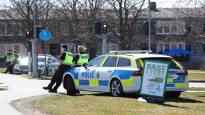The Swedish government has set a goal of training thousands of new police officers, but there is a shortage of sufficiently skilled applicants.
The Swedish government has set an ambitious goal to increase the number of police staff. By 2025, the police should employ 10,000 more people than in the comparison year 2016. Two-thirds of these would be new police officers.
To achieve this goal, the number of people admitted to police training has tripled, but filling vacancies has become a problem. When a sufficient number of eligible applicants are not otherwise available, the requirements have been calculated.
Anyone who had previously dreamed of entering a police school had to take at least Nelonen on a nine-point grading test. In 2016, the bar was dropped to third.
Now Swedish Radio SR (switch to another service) has revealed that the bar has been further lowered, as less is required to get a third. This has been achieved by using those who did less well than the control group previously used as a control group for those who want to become police officers.
According to SR, before the change, three out of three applicants did not reach 26.5 per cent, but after that only 16 per cent fell short of it.
Cases of concern to police educators are being completed
Some of the poorly admitted students are eliminated during their studies, but still some manage to get through education and graduate despite shortcomings. Police inspector teaching future police officers at Södertörn University Johan Siverland says he is concerned about what kind of people in Sweden graduate as police officers.
Published in the professional police magazine Polistidningen in writing (switch to another service) Siverland says the result is police officers whose skill level is so low that they would not even be allowed to perform military service.
According to the teacher, such police can be a danger to themselves and others. He estimates that some graduates are also prepared to falsify evidence, for example.
– The clear majority of students today are decent young men and women with whom I would love to share a scout car. But there are also students who are caught cheating and who have to use psychiatric drugs to cope with everyday life, Siverland writes.
– There are students who show their own driver’s license and ask which numbers are personal identification numbers. There are students in the mid-training exercise who “shoot” a drunken man who doesn’t want to give up his bottle of vodka, he continues.
The “super bad” also needs to be completed to fill the statistics
One of these is the police Stefan Holgersson, who works as a researcher at Linköping University. He already raises similar issues in his research report published in 2018.
– At the time, I interviewed police teachers and police officers, who said that there were very good police officers among the graduates, but also super bad ones. The police authority only wants to be completed in order to fill a certain number. The problem has grown, Holgersson says in Aftonbladet.
There are fears that these police officers will also cause problems for other police officers and, at worst, may result in people being shot dead during police operations.
The police union has also noticed easier access to police training and calls for higher standards.
According to police instructor Johan Siverland, police leadership and politicians must now choose between two options. Do you want skilled, honest and healthy people to be police officers, even if the number of police officers then increases more slowly than desired.
Another option is to produce as many new police officers as possible and as quickly as possible, although this will weaken trust in the police.
– The choice is clear to me, Siverland writes in Polistidningen.
